#you may not like my plural of ‘prefix’
Text
When I graduated with a degree in physics, the biggest and smallest SI prefices were ‘yocto’ and ‘yotta’. Now, because the total amount of information available to humans is growing so quickly, we've had to expand upwards to ‘ronna’ and ‘quetta’. It's only the physicists love of symmetry that has given us ‘ronto’ and ‘quecto’.
I have 47 yoctobytes of Star Trek :D .
#Système International#SI units#SI prefixes#you may not like my plural of ‘prefix’#but i don't care 😛#always a linguist at heart
1 note
·
View note
Text
Tolkien Elven Linguistics for Laurelion/Elarion
Digging up my old TDP/Tolkien posts to tag them properly if I'm going to write ANOTHER one and found my initial mention of Laurelion and Laurelin. I'm still personally in favor of interpreting these names through the lens of their Latin roots, but there's that one person who translated Elarion as "Heir of the Stars" in Sindarin and I wanted to see how Laurelion came out, given the same -ion suffix... so I dug up an internet "every language Tolkien made up" dictionary and took a look.
Elarion
Obviously I have to check the reddit rando's work first: yes, el is "star" in basically every elven language (for reasons), and -ion is a suffix that consistently means "son of" or "descendant," used mostly in patronymics, and occasionally as "place of" in naming locations. But that's skipping out on that ar in the middle—ar means "lord" or "noble," particularly as a prefix (Aragorn). There's a similar three-part name in Pelargir, from pel (pen or enclosure), ar, and cir (ships, with the consonant mutation common to Sindarin), so sandwiching ar seems to be valid. It would theoretically get you "child/place of the star-lord," though I think it would be more likely to construct that as arelion, with elarion being "noble child/heir of the star," or if you want the place -ion instead of the person -ion, maybe something like "palace of the star." I don't actually know any grammar, here... but I think the plural form of el is eli, so elar/arel would be singular.
Laurelion
This is a bit simpler, because as in Laurelin (literally "golden song"), laure is just straight-up "gold" in every elven variant. But Laurelin breaks down into laure and lin (song), and it's pretty consistent across all the -ion instances that that if -lion or -rion appear, it's because of being combined with a word finishing in -l or -r. For example, Eldarion from eldar and -ion for "son of the elves star-folk," or Calion from cala/cale and -ion for "son of light." So I don't think we can jump straight to "golden child/heir," and we wouldn't want to... because el means "star." I'm a little surprised Tolkien didn't actually go to laurel as "golden star" but I think he may have been more of a silver stars kinda guy. Anyway, Laurelion could be "child/heir of the golden star."
A Note on El
El does mean "star," but it's specifically an archaic or poetic way of saying it, coming from a root el meaning effectively "lo!" or "behold!" Even in Quenya, the more common form was elen, and Sindarin used gil as the common term for "star" (though retained the archaic el as well). So Laurelion and Elarion both indicate that older word, which is a big HMMMM.
Final Thoughts
Honestly, I think this is like 300% more thought than the writers put into this, and while it does seem highly likely there are some real Tolkien nerds among them... most of the fantasy words in TDP are very Latin-based in a pretty heavy-handed manner. So it seems more likely to me that Elarion and Laurelion are meant to be read with their Latin roots, respectively "joy" and... probably "victory" or whatever, "laurel" isn't a word we actually know the root of beyond referring to the laurel tree and leaves thereof, but the association is strong enough that it might as well be a translation.
(Probably worth noting that Tolkien was also fluent in Latin.)
#however... HEIR OF THE GOLDEN STAR???#LIKE... Y'KNOW... THE FUCKING SUN?????????#laurelion#tinfoil hat firmly attached#tdp tolkien#this isn't even the tolkien post i planned help
17 notes
·
View notes
Text




flag with symbol
flag | symbol
tenethesia: a subset of aurethesia related to dark auroracore/dark ethereal fantasy and the concepts and visuals behind it
[pt: tenethesia: a subset of aurethesia related to dark auroracore/dark ethereal fantasy and the concepts and visuals behind it. end pt]
day 6 of my 5000 followers event, ‘a term under a neogender umbrella’!
this is a dark auroracore version of aurethesia! i'd consider this a smaller umbrella beneath the umbrella of aurethesia - every tenethesia gender is an aurethesia gender, but not all aurethesia genders are tenethesia.
the main difference between this and aurethesia is that tenethesia includes darker imagery, such as black/dark purple/dark blue accented with the colors included in aurethesia, moral ambiguity or villainy, creatures and characters that lean more towards creepy/scary than cute/pure, etc. the aesthetic's creator has a pinterest where you can compare auroracore and dark auroracore visuals!
colors are taken from various dark auroracore images and the format is the same as the aurethesia flag. the symbol is a magic staff/wand like the aurethesia symbol, but with the diamond swapped out for a crescent moon, since i felt it represented the darker color palette of this aesthetic. the moon is edited from crescent moon (5) from this folder.
the term is 'ten' from 'tenebris' (latin for 'darkness'), 'ethe' from 'ethereal', + 'sia' from 'phantasia' (latin for 'fantasy'). it's pronounced 'ten-eh-thee-shuh', with emphasis on the third syllable.
derived terms:
teth: a tenethesia person. plural is tethi.
teneth: a tenethesia gender. plural is tenethi.
tenin: tenethesia-in-nature (ex: teningender)
ten, tene, neth, nethe, tesia: optional prefixes and suffixes for tenethesia genders. one could also use general aurethesia suffixes for tenethesia genders.
tenethine: having tenethesia qualities. the noun form is tenethinity. (tenethesia equivalent of masculine/masculinity, feminine/femininity, etc.)
transtenethine: transitioning towards tenethinity (tenethesia equivalent of transmasc/transfem/etc.)
tenauric: gender alignment to tenethesia/tenethinity
tags: @radiomogai
flag id: the top image and bottom left image are both a flag with 7 stripes. in order, they are soft indigo, indigo, dark faded indigo, indigo-black, dark faded indigo, indigo, and soft indigo. there are 'swooping' shapes at the bottom left and top right corners, which emerge from the bottom and top stripe respectively and end just over two-thirds of the way up and down the flag respectively. the bottom left 'swoop' gradiates from soft indigo at the bottom stripe to light cyan at the tip, and the top right 'swoop' gradiates from soft indigo at the top stripe to light pink at the tip.
in the center of the left flag is a soft indigo symbol that looks like a magic wand. it's made up of a straight line with a crescent moon with its points facing upwards at one end. at the same end as the crescent moon, one on either side of the line and not quite touching the line itself, are small bird wing shapes. the symbol is angled about 30 degrees to the right.
the bottom right image is the same symbol that is on the top flag. end id.
banner id: a 1600x200 teal banner with the words ‘please read my dni before interacting. those on my / dni may still use my terms, so do not recoin them.’ in large white text in the center. the text takes up two lines, split at the slash. end id.
dni link
#neopronouns5000#neopronouns5k#tenethesia#neogender umbrella#teth#teneth#tenin#teningender#tenethine#tenethinity#transtenethine#tenauric#aurethesia#aein#aeingender#aurethine#my flags#my terms#new flag#new term#mogai flag#mogai term#mogai#long post
107 notes
·
View notes
Text
Did anyone know there's an Anti-endo mogai-culture-is blog?
They tried explaining what endogenic systems are. It was predictably terrible!
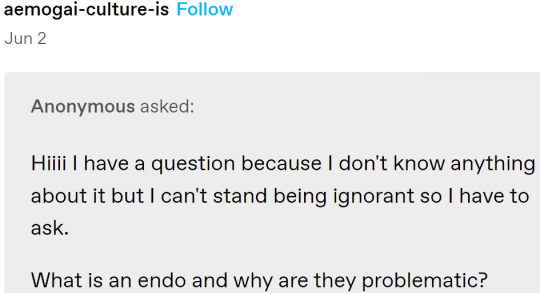
Sorry, anon! If you can't stand being ignorant, you've come to the wrong place!

I've already gone over plenty about how the "systems forming without trauma isn't scientifically possible" is nonsense, right? I mean, even with DID, most academic papers will only say it has a strong association with trauma, but will never make a claim like "it's scientifically impossible for DID to form without trauma." Actual scientists are willing to keep the door open for exceptions however rare they may be. Especially in psychology where there are so many unknowns.
But DID isn't even really what we're talking about, but plurality. And with the ICD-11 saying you can experience multiple "distinct personality states" (which it uses synonymously with alters,) the World Health Organization has acknowledged the existence of endogenic plurality, as have many other psychologists and psychiatrists.

Okay, that "they spread misinformation" line has really aged like a fine... glass of milk... in the sun...
This is embarrassing in every way.
First... endomatrocis isn't a physical condition in anything. It's a completely made-up word.
Second, while this could have meant endometriosis, that's a disease in the uterus, not the spine. Is there a spinal disease with the endo prefix Is don't know about?
And third, endogenic had nothing to do with endometriosis either. "Endo" is a prefix used in countless ways, meaning "within." See endoskeleton, endorphins, endocrine system, etc.
Fortunately, someone is in the comments to correct the misinformation. Unfortunately, they're correcting it with different misinformation.
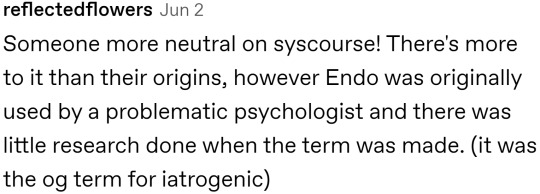
Again, the "endo" prefix is used in a large number of contexts. Yes, some problematic people used words with a popular prefix in ways that could be harmful, because that's how language woks.
The word "endogenous" is generally used to refer to an illness or condition having internal causes. It's true that this was used at some points in sentences suggesting DID wasn't caused by trauma, as has words like "internal." It was also used by Kluft to speculate that there may be a non-pathological endogenous variant of multiplicity that might exist outside of clinical DID. Which... is actually pretty similar to how "endogenic" is used by the endogenic community. See:
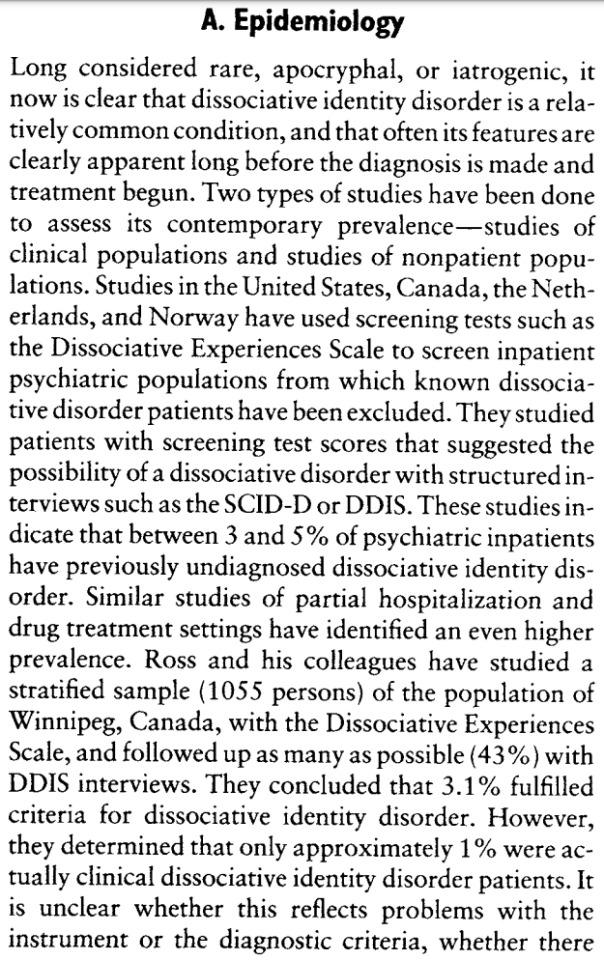

Now, endogenic isn't the same word as endogenous. It doesn't have that same history. But even if it was, endogenous isn't a bad word. It's just a general descriptor for ANY experience that's internally caused.
Freud, who I assume is the controversial psychiatrist being referenced since that's the anti-endo myth, never used either of these words because he's German and instead used a German word with the same very common prefix.
And while mostly beside the point, Freud was endorsing the fantasy theory, not the iatrogenic model which became popularized later. The fantasy theory is that memories of trauma came from fantasizing. The Iatrogenic model suggested DID was caused by mental health professionals and that psychiatrists intentionally or unintentionally implanted trauma memories. In either case, endogeous was never the OG "term" for either.
EVERYTHING ABOUT THESE POSTS ARE JUST MASSIVE DUMPS OF MISINFORMATION.
I feel so sorry for this poor anon who asked a question only to get huge lies that are going to leave them less informed than when they started.
But that's par for the course when asking information of anti-endos. You will usually come out knowing less than you did before asking your question. *grumbles about every anti-endo asked a question about tulpamancy describing it as a spiritual practice.*
Lastly, I'll just leave you with this:
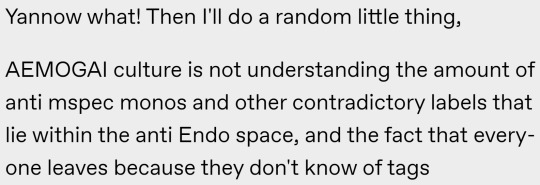
"AEMOGAI culture is not understanding why exclusionists are exclusionists, and why leopards are eating my face."
#syscourse#mogai#pro mogai#endogenic#pemogai#pro endo#pro endogenic#plural#plurality#lgbt#queer#multiplicity#systems#endogenic system#plural system#system#system stuff#sysblr#actually plural#actually a system
28 notes
·
View notes
Text
Eliksni sentence #2 of Null Composure
wow! such progress! much conlang! anyway here's sentence two
English: It pulsed softly, checked and rechecked the permissions that summoned it, and then pushed a data spike solidly into the Vex domain.
Eliksni: Iidathem ir’lohtra aadekspriist, meyvikem taap seyr’meyvikem dreskibrik en kanen dulrakem, taap meydrem israankaviiyor ir’adryst ma’bev Veksehniin.
bonus: here's a behind-the-scenes into my VERY messy process with this sort of "middle step" where i put the sentence into Eliksni word order and mark up all the words so i know what will be a root word/affix/whatever.
Pulse-past simple gentle-adverb access point, check-past simple and two-check-past simple permission-plural RP 3sg summon-past simple, and push-past simple data-spear secure-adj inside Vex-realm.
notes below the cut so yall dont have to deal w a giant block of text (sorry! i'm not a very concise writer...)
stuff im proud of/want to highlight:
the construction for "data spike" literally meaning "machine-thought-spear"
the word for data isn't a direct compound of "machine" and "thought" bc that would be wayyy too long. i used a similar process as i do names where i mashed together individual syllables. i'm gonna try doing this more often, because i think over time really long compound nouns would just get squished down into a new noun
to say that an action is done again (in the way that the re- prefix does in English), you just prefix on "seyr" meaning two. (okay technically it's the counting word for two, not the plain numeral, but like shhhh i haven't even finished the numbers yet so never mind all that).
if you wanted, you could just as easily use a higher number to really emphasize that you've done this action several times, tho anything higher than three comes across as very hyperbolic and usually is done in a joking tone.
the word for Vex is just Veks. no need to reinvent the wheel!
stuff that gave me a headache:
if you compare the sentences word-for-word you may notice i repeated the subject of the sentence "aadekspriist" at the beginning while the English sentences employs the pronoun "it". this is because in Eliksni, the subject of a sentence should not be a pronoun if there is ambiguity about what it is refering to. looking back at sentence 1, the last noun mentioned was "stone", not the access point. therefore, the subject of this sentence needed to be specified so a reader won't get confused about what "it" refers to.
the third person singular pronoun "kan" (here referring to the access point) is in the accusative form "kanen" in the relative clause to make it clear that is it the object of the verb "summoned". because the verb in relative clauses always goes to the end, word order couldn't be relied on to show what the pronoun was referring to
geez that was a lot, huh? if you made it this far, thanks for reading! i'd love to hear you folks' thoughts, ramblings, incoherent screaming into the void, whatever you got. all the tags on the last translation post i did really made me smile :D
new lexicon post will come soon-ish bc i have like twice as many words now! might just post a link to the spreadsheet if i can figure out how.....
Date: 7-31-23
12 notes
·
View notes
Text
new term: exsamic
exsamic, plural exsamic
latin prefix "ex-" (thorough)+old norse sami (origin of same)+suffix "ic" (meaning "of or pertaining to" essentially meaning "completely the same existence"
having a involuntary strong connection with a concept so much you identify as it on a day-to-day basis, and may use it's name as your name and, if applicable, may also talk about it's experiences as if they're your own.
or, as my friend put it, "mhhngnfghh... good GAWD this character is me"
not to be confused with otherkinity, because while 'kin cannot control their identity, the term was coined with the concept in mind that exsamic can control it-it's the connection that they can not control. (i word it like that because some people, like myself, can not control it [at least, on my end, for the most part i can't,] but even then it does not still feel like my typical 'kin experience, thus why i coined the term.)
and it's not to be confused with otherlink or otherheir either, because otherlink is voluntary, and otherheir focuses more on "keeping it's legacy" rather than actually feeling like you ARE it.
i made this term with non-psychotic "IRLs" in mind, and after thinking hard and long about it, and i realized that, no, i am not psychotic, i just didn't have a better word to use to describe my experiences.
if you wanna use a term similar to "IRL" for an exsamic, you can just say you're "samic," for example, i'd say i'm lain iwakura and squares samic. it doesn't have the same punch to it as "IRL" does, but it's better than stealing terminology not meant for people who can't use it.
examples:
"ENA is my exsamic. i am ENA samic."
"i'm exsamic with black cats and amitie from the puyo puyo series."
"i just got done with my samic list, it contains my examic bonds."
i use the term concept in this to mean anything, you could replace all instances of "concept" in this with, say, a fictional character, a song, or an animal.
i also made this definition somewhat vague on purpose so this way more people could identify with it easily, while still at the same time defining a specific experience that one may have. however, if you have any questions, feel free to ask. i am deathly inactive on tumblr, so i may not respond immediately, but i’ll respond.. eventually.
if you want to credit me for the term, you may refer to this post and/or my @ as a source of the term, but if linking back to it’s coiner in general please refer to my main account @hatsilvamiku (tumblr won’t let me @ it for some reason so i just linked to it) and call me hatsiiva miku (caps second i, hatsiIva) or hatsilva miku.
11 notes
·
View notes
Note
im relatively new to this community and I can't google things because my mom has a parental control app on my phone and can see everything I google even if it's on incognito so. What exactly does "Endo" mean?
oh! well endo is short for endogenic - it’s an umbrella term for systems who formed without trauma. we’ll pull some screenshots (with alt text) so you can read more about it without having to click on any outside link.
this is from pluralpedia:
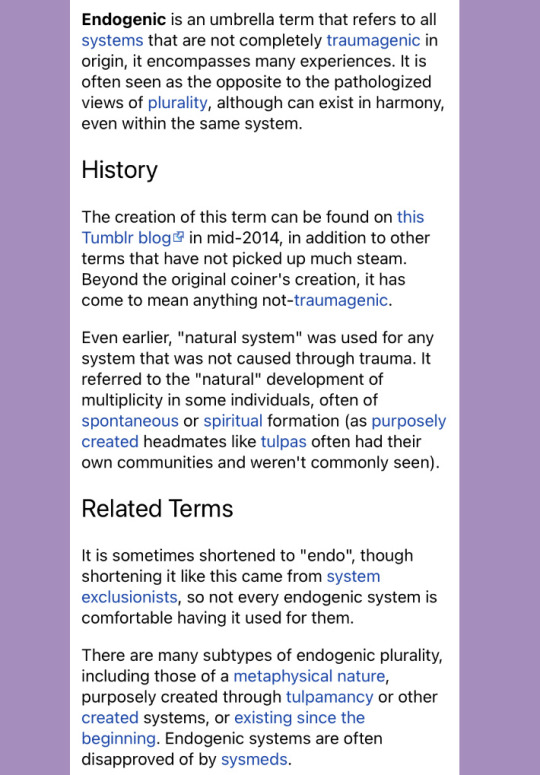
(alt text copied from the site:)
Endogenic is an umbrella term that refers to all systems that are not completely traumagenic in origin, it encompasses many experiences. It is often seen as the opposite to the pathologized views of plurality, although can exist in harmony, even within the same system.
History
The creation of this term can be found on this Tumblr blog in mid-2014, in addition to other terms that have not picked up much steam. Beyond the original coiner's creation, it has come to mean anything not-traumagenic.
Even earlier, "natural system" was used for any system that was not caused through trauma. It referred to the "natural" development of multiplicity in some individuals, often of spontaneous or spiritual formation (as purposely created headmates like tulpas often had their own communities and weren't commonly seen).
Related Terms
It is sometimes shortened to "endo", though shortening it like this came from system exclusionists, so not every endogenic system is comfortable having it used for them.
There are many subtypes of endogenic plurality, including those of a metaphysical nature, purposely created through tulpamancy or other created systems, or existing since the beginning. Endogenic systems are often disapproved of by sysmeds. (end alt text)
this is from the multiplicity and plurality wiki:
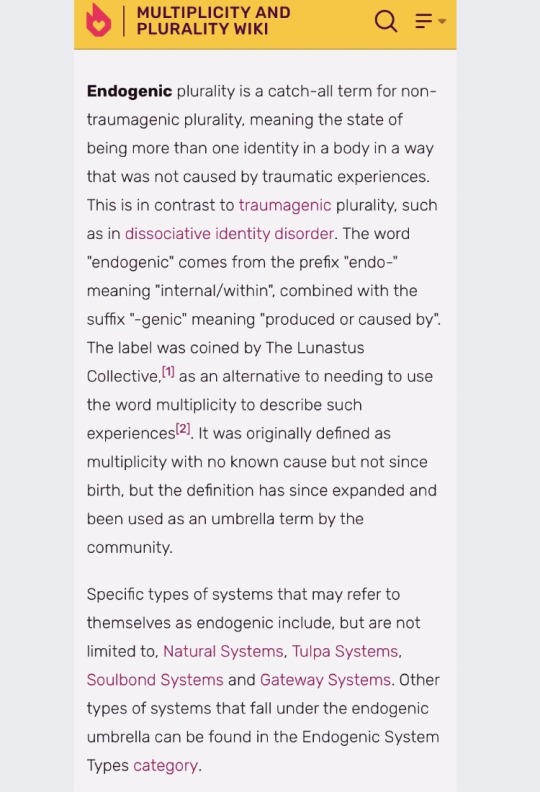
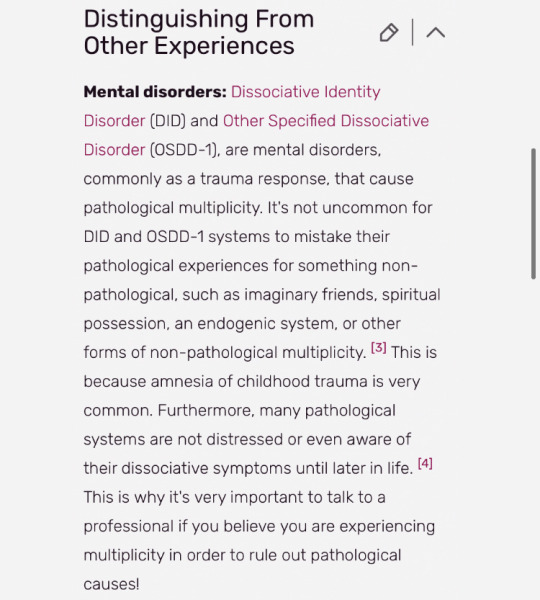
(alt text copied from the site for both images:)
Endogenic plurality is a catch-all term for non-traumagenic plurality, meaning the state of being more than one identity in a body in a way that was not caused by traumatic experiences. This is in contrast to traumagenic plurality, such as in dissociative identity disorder. The word "endogenic" comes from the prefix "endo-" meaning "internal/within", combined with the suffix "-genic" meaning "produced or caused by". The label was coined by The Lunastus Collective,[1] as an alternative to needing to use the word multiplicity to describe such experiences[2]. It was originally defined as multiplicity with no known cause but not since birth, but the definition has since expanded and been used as an umbrella term by the community.
Specific types of systems that may refer to themselves as endogenic include, but are not limited to, Natural Systems, Tulpa Systems, Soulbond Systems and Gateway Systems. Other types of systems that fall under the endogenic umbrella can be found in the Endogenic System Types category.
Distinguishing From Other Experiences
Mental disorders: Dissociative Identity Disorder (DID) and Other Specified Dissociative Disorder (OSDD-1), are mental disorders, commonly as a trauma response, that cause pathological multiplicity. It's not uncommon for DID and OSDD-1 systems to mistake their pathological experiences for something non-pathological, such as imaginary friends, spiritual possession, an endogenic system, or other forms of non-pathological multiplicity. [3] This is because amnesia of childhood trauma is very common. Furthermore, many pathological systems are not distressed or even aware of their dissociative symptoms until later in life. [4] This is why it's very important to talk to a professional if you believe you are experiencing multiplicity in order to rule out pathological causes! (end alt text)
you can search the term “endogenic” on our blog to see positivity posts made by members of our system on endogenic plurality in the past.
we hope this helps!
🐢 kip
6 notes
·
View notes
Text
hazel2468 hey @fierceawakening how did you get that written in Phyrexian? And do you know where I can find out how to say stuff in Phyrexian?
INFODUMP INITIATED

I wrote it.
(lit. "I made the text." as I don't believe we have "write.")
(declarative) + (text) + (make 1p>3p).
Alphabet, posted by WotC, is here:
I keep a dictionary here, which is not completely up to date but has most of what we know:
Typing these made me realize I'd forgotten to add "place" the noun. So uuuuuuuuh it's there now. :'-)
Various fonts are floating around. The one I use I got here:
I believe there are newer versions that have numerals in them, as revealed by the Phyrexian die given out at ONE prerelease. This one doesn't, sadly, just 0123456789 as Arabic numerals, as seen on cards.
And I learned the grammar from GuruJ's Field Guide, which is out of date now sadly:
And here we go, Phyrexian grammar 101:
Most Phyrexian words have two vowel slots in them. The vowel at the end changes (including being dropped) for conjugations, the vowel at the beginning doubles for plurals.
So take the noun pxajt_r, praetor. If I want to say praetors, I double the a. So "praetors" by itself is pxaajtr, but if I want to say "my praetors" or "their praetors," I put a vowel between the t and the r.
Verb conjugations modify that slot also.
Phyrexian sentences are structured like this:
Mood/tense marker - subject - verb (conjugated for the relationship between the subject and the object)
Sentences begin with a bar and end with a hook. If a sentence is a question, a quote, an exclamation, etc. the starting bar is modified but the ending hook is not.
Mood and tense markers tell you when something happened and in what way. For example, xe is present tense/declarative/this is true now, 'u is past tense, lo is imperative (it's not the case now, it's something someone wants you to go and do), əl is negated present tense (this is NOT happening). We know several of them but not all of them. I believe there will be a chart in the Beadle and Grimm's booklet that's coming out.
The subject goes in the middle. If you have adjectives "a green Phyrexian beast" they get glommed on to the base noun. "!Is greenphyrexianbeast fight" = "The green Phyrexian beast fights!"
If you're trying to say "the green Phyrexian beast fights the fleshlings!" that would be "!is fleshlings greenphyrexianbeast fights (where the verb is conjugated as "it toward them," see below)"
Verb conjugations are... weird as hell.
Verbs are conjugated by changing the last vowel (usually the second though some prefixes have vowels in them.) So you have a word like "sol_m," hit, and you use a vowel in the _ spot to indicate who's hitting who.
There aren't transitive verbs (verbs with objects, "she hears music") and intransitive ones ("she dances.") Instead, you look at who is doing the action and then who it's "pointing at" as in: am I doing something to/for you, or am I just doing it myself, or... etc.
This is the chart:
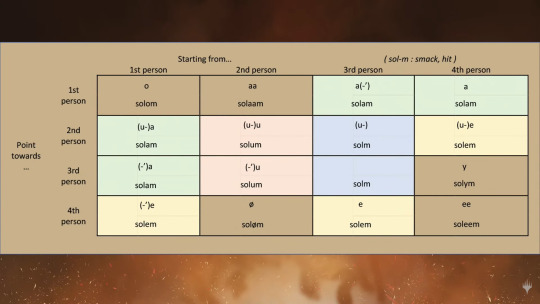
Nouns use this too. If I'm trying to say "my book," the noun would be "tek_t", and to say it's mine I start with me and then point at myself. So "xe tekot," "Declarative - book - me toward me," means "It's my book/The book is mine/etc."
The weird stuff in parentheses is "vowel harmony," but we haven't been told how that works yet. The possible explanation that makes the most sense to me personally is that when certain vowels are near certain consonants, that means the previous consonant's radical changes with it. I am not sure this is the case so I don't do it, which means I may slightly misspell some verbs. :-)
6 notes
·
View notes
Note
creature with the book possible translation. hodie is the common adverb for today, currently, presently. I don’t think it could be anything else here. if the second word is nonās it could be a form of nonae, a calendar term for the ninth day of a month. so he could be trying to say the date. the grammar doesn’t quite line up tho. calendar terms like that always take the plural, meaning the -ās ending would have to be accusative, which doesn’t rly work. but bc it’s an illuminated manuscript my guess is the writer is using ecclesial or late period latin, so they may be unfamiliar or simply not care abt the strict grammar rules for the julian calendar bc their spoken language probably isn’t latin. it could also be a fucked up grammar thing of some random non- word, a prefix type thingy to negate a verb, so he could be saying “not today” which would be properly devilish.
spank you x
2 notes
·
View notes
Note
Hey, I just wanted to drop in and offer some positivity/support from a cisplural (although tbh I may have been transplural if I'd been a singlet, plurality is my natural state.)
(Alsoalso I have very complicated feelings about the prefix cis because of being genderfluid intersex transgender/transsexual but I still recognize it fits. Though tbh I wish there was a label like genderqueer/nonbinary for transplurality. Pluralqueer? Like some of how I engage with continuing to be plural is a choice, I do do soulbonds and may at some point make tulpas if that counts, but some of it matches my "assigned plurality at origin" lol. Does that make any sense? Cisplural isn't quite right but since my origin wasn't by choice and I AM plural transplural doesn't fit either.)
Anyway yeah. I think y'all are really cool and I want transplurals to know that you have some cis(?)plurals on your side.
We really appreciate this ask thank you! We think we will coin pluralqueer or something similar! ☺️
#transplural#block me and move on#transid#transidentify#plural pride#plural#pro endo#transid safe#pro transid#transid community#transid coining#transid positivity#positivity
6 notes
·
View notes
Text
I'm just poking through some of my abandoned conlang stuff, and aside from the evil English spelling reform I devised last year, the one that really piques my interest is this conlang, almost immediately abandoned after creating it, called... I can't tell whether it's supposed to be styled SheizeN or sheizeN. It looks like it was intended to have a syllabary with two characters reserved for coda consonants, so I'm not sure why such styling was necessary... but I'll give it to past me, it looks really cool.
(After Googling the name to see if it happened to mean anything somewhere, the only entry that was spelled the same came from Urban Dictionary. Apparently it's also somewhat similar to a vulgar word in German.)
So sheizeN has a couple odd features. I'm pretty sure it arose from my finding a list of bad conlang ideas and deciding to play with a couple of them. For one, verbs are preceded by a word which agrees with "tense, aspect, and absolutive class" and denotes whether the absolutive argument deserves what is happening to it (or, if the verb is negated, whether it would have deserved what would have happened if the verb wasn't negated).
(There's also a perplexing plural suffix that references a verb suffix that in turn references the class ergative suffix, like some sort of phonological ouroboros, and I swear it can only end in stacking the same suffix on top of itself, which can't be legal.)
SheizeN also has a noun class system. Each of its thirteen noun classes is based on a Dungeons and Dragons class, and they actually seem to work pretty well. For instance, the Bard class encompasses all art forms and related words, Druid encompasses plants, fungi, and animals not covered by other classes, Paladin encompasses abstract qualities and forms of speech, and so on. Nouns are formed by combining a short root with a prefix for the class, so the same root can belong to multiple words that may be thematically similar in some way, but have very different meanings.
I'd like to share one of these with you, out of the six words I ever created for sheizeN. The word for "prince" is shoko, a Fighter-class word (Weapons, beasts of burden, and humans not otherwise specified) with the prefix sho- and the root -ko. With me so far? Good.
The root -ko happens to be included in two other words. One of these is the Paladin-class word sheiko, meaning "honor." Tangentially related, I suppose. It does make a sort of sense.
Then we have the third -ko word. This one is a Ranger-class noun—which encompasses people and animals that stalk some sort of prey. The translation of this word isn't as clear-cut as the other two—it's listed as "one searching for something abstract."
So, what is this word?
The prefix for Ranger-class nouns happens to be zu-. Which makes the word, well...
Zuko.
#conlang#avatar the last airbender#I guess#since it's been so long I can't *prove* I created that class prefix just for a pun#but I'm pretty sure I did
1 note
·
View note
Text
The Words of Mormon. "Myrrh from the Sun." Parsha Ma'rah, "The Mirroring" begins.

Mor=Myrrh
The term used in Scripture for "pure myrrh" is "mor deror", which literally means "free myrrh." This spice is associated with the name Elokim of bina and is therefore called "free" myrrh. This is the mystical meaning of the verse, "and you shall proclaim freedom [throughout the land and to all its inhabitants]"
Mon= like, within
="Myrrhman."
מה
The two interrogative pronouns מה (ma) and מי (mi) occur frequently in the Biblical narrative; מה (ma) slightly more often than מי (mi). The difference between the two is that the pronoun מה (ma) asks for a quality (what, as in "what is your name?"), whereas מי (mi) asks for identity (who, as in "who are you?"). Here and there it occurs that where English would use 'what', Hebrew uses 'who', for instance when asking about the identity of a nation (Deuteronomy 4:8; 'who of the nations...'), or simply that of whoever ('which one' or 'who of the...').
Note that our word מי (mi) is spelled the same as the construct-plural form of the word מים (mayim), meaning waters. Hence מי also means 'waters of'.
A similar particle מו (mo) combines with all the common prefixes to form poetic equivalents of these particles: כמו (kemo), like or as if; למו (lemo), onto; במו (bemo), within.
CHAPTER 1
Mormon abridges the large plates of Nephi—He puts the small plates with the other plates—King Benjamin establishes peace in the land. About A.D. 385.
A single chapter, single Parsha Book, the Words of Mormon address the contents on the Big Plates. The Hungry Man Meal! 385= "Mirroring of the Truth."
1 And now I, Mormon, being about to deliver up the record which I have been making into the hands of my son Moroni, behold I have witnessed almost all the destruction of my people, the Nephites.
So if a Mormon is "Like myrrh, a freedom fighter" what is a Mor-oni?
Mor=see above
Oni= the tireless power from above
און
The Noun און ('on) is describes a surplus of vigor or wealth and specifically of reproductive powers.
The narrator says he is prophesying about the destruction of the Jews at the hands of Gentiles and is calling upon God, the Tireless Power of Freedom to give him testimony that will put an end to it. The coming of Christ which was supposed to create "Peace on Earth, Goodwill Towards Men, Glory to God on High" caused death and destruction on this world and it continues to this day.
This contradiction, this gross misunderstanding of the God of Israel and the nature of the Son of the God of Israel is called apostasy and it has cast a deadly gloom over this world for long and long:
2 And it is many hundred years after the coming of Christ that I deliver these records into the hands of my son; and it supposeth me that he will witness the entire destruction of my people. But may God grant that he may survive them, that he may write somewhat concerning them, and somewhat concerning Christ, that perhaps some day it may profit them.
3 And now, I speak somewhat concerning that which I have written; for after I had made an abridgment from the plates of Nephi, down to the reign of this king Benjamin, of whom Amaleki spake, I searched among the records which had been delivered into my hands, and I found these plates, which contained this small account of the prophets, from Jacob down to the reign of this king Benjamin, and also many of the words of Nephi.
Benjamin means to do what is right. It means to wake up, grow up and head South is to do what is profitable for everyone. The skill set required was first taught to men by God using the Torah. Men are now required to teach it to each other:
��
The noun בן (ben) means son, or more general: a member of one particular social or economic node — called a "house", which is built upon the instructions of one אב ('ab), or "father" — within in a larger economy (hence: the "sons of the prophet" are the members of the prophet-class; the prophets). This noun obviously resembles the verb בנה (bana), to build, and the noun אבן ('eben), stone.
ימן
The root ימן (ymn) is of unclear pedigree and meaning but it has to do with both the right hand side and the southern direction, which are both decidedly positive (whereas left and north have negative connotations). This also indicates that one normally faces east, which corresponds to the past.
Noun ימין (yamin) means right, i.e. right hand, side or the right of other parts of the body. Adjective ימיני (yemini) meaning on the right. Verb ימן (yaman) means to go or choose the right or use the right hand. Adjective ימני (yemani) meaning right hand or right. Noun תימן (teman) meaning south.
The narrator says the Gospels, which enhance our understanding of the Godly Nature even further are not too shabby for the purposes of going South:
4 And the things which are upon these plates pleasing me, because of the prophecies of the coming of Christ; and my fathers knowing that many of them have been fulfilled; yea, and I also know that as many things as have been prophesied concerning us down to this day have been fulfilled, and as many as go beyond this day must surely come to pass—
5 Wherefore, I chose these things, to finish my record upon them, which remainder of my record I shall take from the plates of Nephi; and I cannot write the hundredth part of the things of my people.
6 But behold, I shall take these plates, which contain these prophesyings and revelations, and put them with the remainder of my record, for they are choice unto me; and I know they will be choice unto my brethren.
7 And I do this for a wise bpurpose; for thus it whispereth me, according to the workings of the Spirit of the Lord which is in me. And now, I do not know all things; but the Lord knoweth all things which are to come; wherefore, he worketh in me to do according to his will.
8 And my prayer to God is concerning my brethren, that they may once again come to the knowledge of God, yea, the redemption of Christ; that they may once again be a delightsome people.
9 And now I, Mormon, proceed to finish out my record, which I take from the plates of Nephi; and I make it according to the knowledge and the understanding which God has given me.
10 Wherefore, it came to pass that after Amaleki had delivered up these plates into the hands of king Benjamin, he took them and put them with the other plates, which contained records which had been handed down by the kings, from generation to generation until the days of king Benjamin.
11 And they were handed down from king Benjamin, from generation to generation until they have fallen into my hands. And I, Mormon, pray to God that they may be preserved from this time henceforth. And I know that they will be preserved; for there are great things written upon them, out of which my people and their brethren shall be judged at the great and last day, according to the word of God which is written.
12 And now, concerning this king Benjamin—he had somewhat of contentions among his own people.
13 And it came to pass also that the armies of the Lamanites came down out of the land of Nephi, to battle against his people. But behold, king Benjamin gathered together his armies, and he did stand against them; and he did fight with the strength of his own arm, with the sword of Laban. [sword of purity].
14 And in the strength of the Lord they did contend against their enemies, until they had slain many thousands of the Lamanites. And it came to pass that they did contend against the Lamanites until they had driven them out of all the lands of their inheritance.
15 And it came to pass that after there had been false Christs, and their mouths had been shut, and they punished according to their crimes;
16 And after there had been false prophets, and false preachers and teachers among the people, and all these having been punished according to their crimes; and after there having been much contention and many dissensions away unto the Lamanites, behold, it came to pass that king Benjamin, with the assistance of the holy prophets who were among his people—
17 For behold, king Benjamin was a holy man, and he did reign over his people in righteousness; and there were many holy men in the land, and they did speak the word of God with power and with authority; and they did use much sharpness because of the stiffneckedness of the people—
18 Wherefore, with the help of these, king Benjamin, by laboring with all the might of his body and the faculty of his whole soul, and also the prophets, did once more establish peace in the land.
Benjamin and Mormon, "Do what is right" and to "Be like Him" these are the ways one uses the Big Plates to mirror oneself against the Supreme, the Endless God of Freedom.
0 notes
Text
word hunt cheat free JH04#
💾 ►►► DOWNLOAD FILE 🔥🔥🔥🔥🔥
This word hunt cheat gives you a list of unscramble word ideas ranked by length (key driver of points) and shows you where they are on the word grid. Helps you win every gamepigeon word hunt minigame with this beautiful visual solver. 25 votes, 23 comments. I got exhausted from always losing to my friends in word hunt (we play on our iPads in class), so I learned web. Word Hunt Answers – No timers! Play at your own pace! – No lives! Play unlimited word puzzle games! – Hints available to help you complete the word search. 9 This word hunt cheat gives you a list of unscramble word ideas ranked by length key driver of points and shows you where they are on the word grid. It is designed to help solve Game Pigeon's word hunt game. Enter your letters in the box need 16 letters for 4x4 boggle grid and hit the "Get Words" button. The grid will populate with the letter tiles and the words you can find in the grid will appear in a table below. This guides you through the word search puzzle. Page through the scrambled letters in the word list to find the ones you feel comfortable with playing in your word game. This word hunt cheat is based on an anagram dictionary; we've created a couple of alternative versions of the solver which have been tweaked for different games. It works regardless of word length. We have another version of the boggle word finder that is a scramble with friends cheat with scores for that game. We cover different sizes for any android device word puzzle game. Have fun with your word hunt game need a new puzzle? We've started keeping a list of places to play. The leading 4x4 boggle game that we're aware of is Zygna's Scramble with Friends. Pogo also has a game called Boggle Bash, which is another option for those of your who like to play 4x4 boggle. There are several variants of boggle available at the Puzzle Baron's website - they call it Word Twist and have 4x4 and 5x5 versions available. Know of another version of the game word grid search using 4x4, 5x5, or 6x6 grids? Send us an email and describe any special rules, we can take a look at customizing a solver One potential strategy element to consider in selecting words for traditional boggle word puzzle games is the likelihood of another player finding the same letter word in the grid. This is very much a judgement call - this boggle solver identifies a list of words, ranked by points, but you may want to focus your efforts on the more obscure selection. The boggle cheat isn't perfect - if you're really good at rattling off prefixes and suffixes for a word including plurals , it may be faster to just do this manually as you play. In this case, you would grab a root-word from the boggle cheat DESIRE and watch out for obvious versions of the word desires, desired, etc. Looking for new puzzles and a word hunt game? We're regularly expanding our collection of puzzles, word solver tools, and hidden word search game s. Check out our Free Cryptogram puzzles if you are good at recognizing patterns. These are famous or funny quotes encryped with a scrambled alphabet code - if you can guess the code, you can decipher the message. Or check out our new word swapz game if you like unscrambling words and spelling challenges. Flip letters in the original word back and forth until you manage to figure out all the meaningful words in the puzzle. Use tricks like double letters, remaining letters, anagrams, multiple words, and clues to missing words or different words. Or even apps. Of course, if you're in school it's important to keep your grades up during these digital learning days. That's why we created a Finals Calculator to make sure your final grade is still on track. This simple calculator handles the essential question every student asks: What do I need to get on my final to pass? Because in reality, if you're bored enough to read this far down the page, you've probably been too busy with words with friends , scrabble words, vocabulary words, boggle solving , playing word chums , or using another word cheat this spring Stuck solving a puzzle? No worries, we can help with that too! We offer a wide variety of word games solvers and tools to help crack pen and paper ciphers! We have solvers for boggle, scrabble, and tools to help unscramble words. You can even use them to solve words with friends and the specialized versions of boggle Scramble with Friends and large matrixes - 5 x 5 boggle and 6 x 6 boggle. These tools can also be used as a word crack cheat and ruzzle cheat. Finally, if you need to make a word scramble or crossword puzzle - for a class exercise, business icebreaker, party favor, or other special occaision - we've got tools for that too. You can even save you work for future events and classes. Or to settle a score with your friendly neighborhood word crack cheat or ruzzle cheat, of course Have them do a word search on ancient bolivian archery techniques. That'll teach em Start Prev Next End. Using This word hunt cheat: This word hunt cheat gives you a list of unscramble word ideas ranked by length key driver of points and shows you where they are on the word grid. More From Hanging Hyena: Looking for new puzzles and a word hunt game? Or even apps Of course, if you're in school it's important to keep your grades up during these digital learning days. Please send all feedback, complaints, and lucrative sponsorship deals to admin hanginghyena. All Rights Reserved. We like cookies and use them on the site, per our Privacy Policy.
1 note
·
View note
Text
2 Corinthians 6:11–13
11 Τὸ στόμα ἡμῶν ἀνέῳγεν πρὸς ὑμᾶς, Κορίνθιοι, ἡ καρδία ἡμῶν πεπλάτυνται· 12 οὐ στενοχωρεῖσθε ἐν ἡμῖν, στενοχωρεῖσθε δὲ ἐν τοῖς σπλάγχνοις ὑμῶν· 13 τὴν δὲ αὐτὴν ἀντιμισθίαν, ὡς τέκνοις λέγω, πλατύνθητε καὶ ὑμεῖς.
My translation:
11 Our mouth has opened to you, Corinthians, our heart has been enlarged; 12 you are not restricted in our affections, but you are restricted in your affections; 13 with respect to a proper exchange, I’m speaking as to children, also you be enlarged in heart.
Notes:
6:11
τὸ στόμα, modified by possessive genitive ἡμῶν, is the subject of the perfect ἀνέῳγεν (from ἀνοίγω). The perfect is intransitive. The singular noun could be distributive, or else refer to a collective proclamation. The verb is modified by the spatial prepositional phrase πρὸς ὑμᾶς. The phrase, “Our mouth has opened,” is taken by most translations as a Greek idiom meaning, “We have spoken with candor” (EGGNT); NASB, NIV, NET: “... freely”; HCSB: “... openly”; NRSV: “... frankly”.
Κορίνθιοι is a vocative, probably ‘here intended as a sign of his affection for his readers’ (ICC).
πλατύνω (3x) is, “I make broad, enlarge” (BDAG), from τό πλάτος (4x) “breadth” (cf. πλατύς (1x) “broad, wide”; most translations, “open wide”. ἡ καρδία, modified by possessive genitive ἡμῶν, is the subject of the perfect πεπλάτυνται. The singular noun is distributive. The perfect verb (“our heart has been opened wide”, HCSB) may be stative (“our heart is wide open”, NRSV). NRSV, NIV, NET repeat πρὸς ὑμᾶς from the earlier phrase.
6:12
The negated present passive οὐ στενοχωρεῖσθε (from στενοχωρέω, “I confine, restrict, restrain”; see note on 4:8) is modified by the locative prepositional phrase ἐν ἡμῖν, literally, “You are not restrained in us”; if the phrase ἐν ἡμῖν is taken to anticipate ἐν τοῖς σπλάγχνοις ὑμῶν below, then the meaning is, “You are not confined [to a narrow place in our affections]”; NIV: “We are not withholding our affection from you” (sim. NRSV, NET). Alternatively, if no reference to the heart is intended in ἐν ἡμῖν, then the prepositional phrase could be instrumental (NASB: “You are not restrained by us”; HCSB: “You are not limited by us”).
τό σπλάγχνον (11x), from σπλαγχνίζομαι (12x) “I have pity”, is literally, “intestines” (always plural in the NT); seen as the seat of the emotions in the ancient world, it is effectively equivalent to the English, heart; most translations, “affections”. The present passive στενοχωρεῖσθε (from στενοχωρέω; see above) is modified by the locative prepositional phrase ἐν τοῖς σπλάγχνοις, which could be locative or instrumental. ὑμῶν is possessive or subjective. “You have too narrow a space for me in your heart; you do not give me love comparable to mine for you” (NIGTC).
6:13
ἡ ἀντιμισθία (2x) is from ἀντί + ὁ μισθός “wages, reward”. The prefix emphasizes that something is received that is due or in exchange for something, i.e., “reward” or “penalty”. Here, however, context seems to demand a more neutral meaning: “exchange” (BDAG); NRSV: “in return”; HCSB: “response”. αὐτὴν functions as the identical pronoun (“the same ...”), attributive with τὴν ... ἀντιμισθίαν, giving much the same idea as ἀντί-. The noun could be an accusative of respect, but Moule notes that the phrase ‘looks like a subtle blend of τὸ δε αὐτό, in the same way, and κατʼ ἀντιμισθίαν, by way of recompense, and on this showing, might be rendered and accordingly, by way of response on your part.’ NIV, NET: “As a fair exchange”; HCSB: “As a proper response”. ‘it is best to understand the phrase as standing in apposition to the rest of the sentence: “You also, do enlarge your hearts—the equivalent recompense”’ (ICC).
The comparative particle ὡς with the dative τέκνοις qualifies the present λέγω (“I speak as to children”); NIV, HCSB, NET: “my children”.
ὑμεῖς is the emphatic subject of the aorist passive imperative πλατύνθητε (from πλατύνω “open wide”; see note on v. 11). καὶ is adjunctive (“also”). The passive verb is intransitive, but most translations render it as transitive with the direct object, “your hearts”.
1 note
·
View note
Text
Language typology
Morphology
You can read more about morphology here.
Morphological typology groups languages on the basis of how they form words by combining morphemes. The three morphological types are analytic, synthetic, and polysynthetic.
Analytic languages
In analytic languages, each morpheme is an independent word and words tend to be uninflected. Grammatical categories are indicated by word order or by bringing in additional words. Therefore, context and syntax are more important than morphology.
Analytic languages include some of the major East Asian languages, like Chinese, a Sino-Tibetan language of China, in all its varieties, but also Haitian Creole, an Indo-European language spoken in Haiti. Here is an example of a sentence in the latter:
Mari te renmen flè yo.
Marie past like flower plural
“Marie liked the flowers”
Some languages that are not considered analytic share certain traits with them, such as Afrikaans and English, both Indo-European languages of South Africa and 59 countries, respectively.
Isolating languages
Isolating languages have no inflectional morphology, unlike analytic ones, which have little or no inflection. Their morpheme-to-word ratio is close to one, so that each word almost always contains a single morpheme. Examples of isolating languages are Igbo, an Atlantic-Congo language spoken in Nigeria, and Vietnamese, an Austroasiatic language of Vietnam.
Synthetic languages
In synthetic languages, a root combines with several morphemes to form a word. The morphemes may be distinguishable from the root or not, and may be fused with it or among themselves. Word order is less important than in analytic languages, and there tends to be a high degree of agreement between different parts of the sentence.
Most Indo-European languages are synthetic. According to whether morphemes are clearly differentiable, two kinds of synthetic languages can be distinguished: agglutinative and fusional.
Agglutinative languages
In an agglutinative language, morpheme boundaries are clearly identifiable, and each morpheme represents only one meaning. Sometimes a word can represent a complete sentence.
Hungarian, a Uralic language spoken in Hungary, and Korean, a Koreanic language of North and South Korea, are examples of agglutinative languages.
This is an extremely long word in Hungarian:
legeslegmegszentségteleníttethetetlenebbjeitekként
leges-leg-meg-szent-ség-telen-ít-tet-het-etlen-ebb-je-i-tek-ként
“like those of you that are the very least possible to get desecrated”
Words of such length are not used in practice and are difficult to understand even for natives.
Fusional languages
In a fusional language, morpheme boundaries cannot be clearly identified because bits of meaning are fused together into a single word or affix. Morphemes may also be expressed by tone and vowel gradation, also known as ablaut.
Two examples of fusional languages are Ona, a Choan language that used to be spoken in Argentina and Chile, and Tigrinya, an Afro-Asiatic language of Eritrea and Ethiopia. The former codes evidentiality and gender in a single suffix:
Ya ktįmi xįnn nįy ya.
Ya k-tįmi x-įnn nį-y ya.
1st person relativizer-land go-certainty.masculine present-masc. 1P.
“I go to my land”
Polysynthetic languages
In polysynthetic languages, a word is a complete sentence and morphemes may modify the meaning of the root. These languages have a very high morpheme-to-word ratio. They can also be agglutinative or fusional.
Most of the indigenous languages of the Americas are polysynthetic, including Inuktitut, an Eskimo-Aleut language spoken in Canada, and Tiwi, a language isolate of Australia.
For example, this is a word-sentence in Tiwi:
Pitiwuliyondjirrurlimpirrani.
Pi-ti-wuliyondji-rrurlimpirr-ani.
3Pplural-3singular.feminine-dead.wallaby-carry.on.shoulders-past.habitual
“They would carry the dead wallaby on their shoulders”
Parameters of variation
There are two other types of morphological variation:
Prefix/suffix differences: Many prefixes do not change the category of the word they attach to (“do” and “undo” are both verbs), while most suffixes are categorychanging (“do” is a verb and “doer” is a noun). The latter are more frequent.
Pronoun-drop (pro-drop): In languages where verbal inflectional morphology indicates the person and number of the subject, the subject is often omitted.
57 notes
·
View notes
Note
Could you explain more about your old language names? How do you go about it? Just curious :-) i love unique names!
AH sure thing !! i love going through my naming system :] this is LONG so i’ll format it with a “read more,” the rest of the answer is below the cut !
so for a lot of them i’ll use a combination of : actual canonical prefixes / suffixes used in the books or other official media , later early modern english up to modern english from the early - mid victorian era [so think ~1600s up to 1850-60] , some words derived directly from old english , auld scots and modern scots slang or terminology for parts of nature , and the three goidelic celtic languages [manx, irish, and scottish gaelic] .
a mixture of all of those is how i end up with names like marramear, crottlefleck, eilidbriar, waxwelk, hundtooth, etc etc. i’ve found that i primarily use different either old-english derived or goidelic phrases n’ words for flora and fauna or environmental when building names, as they’re pretty abundant and there are a lot of words for very specific instances, especially relating to weather / water / feelings of nature. i mainly look to early modern and old english then for more color, pattern, aspect, or body part related parts of names, and there are a lot of terms out there for animal anatomy specifically.
two examples of this i can pull out are roinmist and ammilback. ròin is actually the gaelic plural for “seals” (sin. ròn) and roinmist gets his prefix from the fact that his coat has a similar spotted pattern to harbour seals found in the northern isles !! ammil then comes from the O.E. word for “enamel,” and refers to the thin + glittery layer of ice that forms on plants when snow re-freezes after first thawing out; ammilback gets her name from the fact that she has a very dark, earthy appearance, but her coat appears as if it’s been “salted” or sprinkled with white, as the ends of her fur hold white tips that stand out against a much darker undercoat.
others, like woldspirit and braithwight, are less appearance based ! wold is a term used for a very high and open piece of moorland, and is usually seen now as part of names of towns. it’s derived from wald, an old english term for a piece of forest. woldspirit was promoted directly from apprentice to chaser when it was discovered just before her warrior ceremony that she could see the sylphs, and thus was given the suffix she has now. braithwight, in comparison, has a name with 3 meanings actually ! [to me, anyways.] to start with, their warrior name was based off of the actual human surname braithwaite, an english habitational name, pulled from old norse meaning “broad / open clearing.” braithwight as a warrior name then is a mix of braith, an old term used to describe the color of an animal as being black and white, and wight, an old english word for a ghost or spirit / a supernatural entity. their name is similar to whinwicht’s, with whin being another term for furze or gorse flowers and wicht being a scottish variation of “wight.”
i hope any of this was even just mildly helpful / gave any insight at all !! you can go a lot of directions with it, especially if you save any good resources that you come across !! i may make a separate post just for some of the ones i use more frequently.
#I LOVE NAMES i have so many bookmarks help#bog rambles#bogwhisker#clans of the isle#isle clans#my wc#warrior cats
5 notes
·
View notes